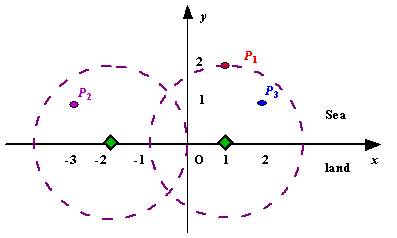POJ 1328 Radar Installation
Radar Installation
| Time Limit: 1000MS | Memory Limit: 10000K | |
| Total Submissions: 77074 | Accepted: 17265 |
Description
Assume the coasting is an infinite straight line. Land is in one side of coasting, sea in the other. Each small island is a point locating in the sea side. And any radar installation, locating on the coasting, can only cover d distance, so an island in the sea can be covered by a radius installation, if the distance between them is at most d.
We use Cartesian coordinate system, defining the coasting is the x-axis. The sea side is above x-axis, and the land side below. Given the position of each island in the sea, and given the distance of the coverage of the radar installation, your task is to write a program to find the minimal number of radar installations to cover all the islands. Note that the position of an island is represented by its x-y coordinates.

Figure A Sample Input of Radar Installations
We use Cartesian coordinate system, defining the coasting is the x-axis. The sea side is above x-axis, and the land side below. Given the position of each island in the sea, and given the distance of the coverage of the radar installation, your task is to write a program to find the minimal number of radar installations to cover all the islands. Note that the position of an island is represented by its x-y coordinates.

Figure A Sample Input of Radar Installations
Input
The input consists of several test cases. The first line of each case contains two integers n (1<=n<=1000) and d, where n is the number of islands in the sea and d is the distance of coverage of the radar installation. This is followed by n lines each containing two integers representing the coordinate of the position of each island. Then a blank line follows to separate the cases.
The input is terminated by a line containing pair of zeros
The input is terminated by a line containing pair of zeros
Output
For each test case output one line consisting of the test case number followed by the minimal number of radar installations needed. "-1" installation means no solution for that case.
Sample Input
3 2 1 2 -3 1 2 1 1 2 0 2 0 0
Sample Output
Case 1: 2 Case 2: 1
Source
解析:每一个岛屿要么不能被雷达覆盖到,要么在海岸线上存在一个区间,该岛屿只能被放置在此区间内的雷达覆盖到。可以处理出这n个区间,区间重叠的部分可以共用一个雷达,接下来就很容易了。
#include <cstdio>
#include <algorithm>
#include <cmath>
using namespace std;
const int MAXN = 1000+5;
int n, d;
int x[MAXN], y[MAXN];
pair<double, double> p[MAXN];
void solve()
{
double offset;
for(int i = 0; i < n; ++i){
if(d < y[i]){
printf("-1\n");
return;
}
offset = sqrt(d*d-y[i]*y[i]);
p[i].first = x[i]-offset;
p[i].second = x[i]+offset;
}
sort(p, p+n);
int res = 1;
double l = p[0].first, r = p[0].second;
for(int i = 1; i < n; ++i){
if(p[i].first > r){
++res;
l = p[i].first;
r = p[i].second;
}
else{
l = max(l, p[i].first);
r = min(r, p[i].second);
}
}
printf("%d\n", res);
}
int main()
{
int cn = 0;
while(scanf("%d%d", &n, &d), n){
for(int i = 0; i < n; ++i)
scanf("%d%d", &x[i], &y[i]);
printf("Case %d: ", ++cn);
solve();
}
return 0;
}


 浙公网安备 33010602011771号
浙公网安备 33010602011771号